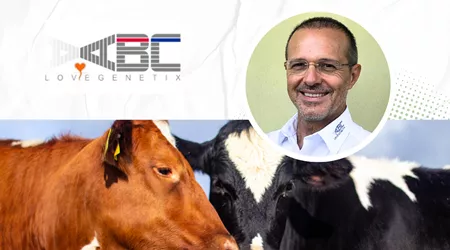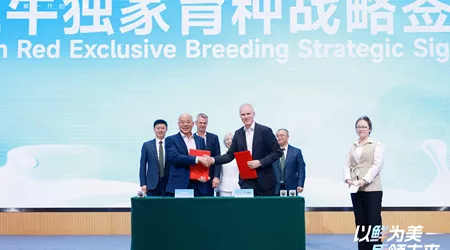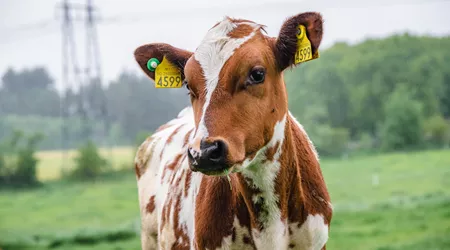When and how did your business collaboration with Geno Global start?
I started collaborating with Geno Global in 2017. I was looking for a dairy breed to use in combination with Holstein and other dairy genetics; my research's critical traits were great fertility, health traits, and a high milk potential.
Norwegian Red offered all of this, and I saw that Geno Global already had several results and trials worldwide with a dynamic R&D activity. I was also interested in their new semen technology (SpermVital).
Could you please tell us something about dairy farming in Portugal?
Portugal has 300.000 milking cows distributed in the country with different climate conditions and management systems. There are dairy farms with high intensive inputs and cows staying inside all year while others where cows remain outside all year grazing.
There is a concentration of the cow population, with ⅓ located in the North close to the coast, ⅓ situated in the Azores Islands, and the remaining cows are spread throughout the rest of the country.
The feeding systems in use are TMR in the mainland with a basis of maize silage, straw, grass silage, and concentrate; in the Azores islands, the grazing system is predominant thanks to the ideal climate conditions during all months of the year. Milk production has been in a dynamic situation over the last years; different reasons and conditions led to the increase in some herds' size and the disappearance of others, increasing the businesses' financial efforts.
What are the main challenges in the dairy industry in Portugal?
I believe that the word efficiency could perfectly resume the main challenges in the dairy industry in Portugal. Thinking about dairy farms, it often happens that people are expecting the industry to raise milk prices. This is understandable, and fair milk it's, of course, critical to sustaining the business, but it's something that farmers cannot easily change, so it would be more beneficial for them to focus on what's possible to change or improve in their operation to be more efficient and decrease their cost of production.
Genetics is a very important tool to achieve this as well as good management and correct feeding. There's a high cost due to the collection of milk on the industries level, and that's why focusing on Kg of milk solids produced instead of liquid milk could be beneficial for them.
What are the main traits that Portuguese dairy farmers look at in the selection of the bull?
Milk production with good components is an important criteria for bulls selection. Beta Casein A2A2 is preferred by many farmers, while in terms of conformation, good udders and feet & legs are always required. Norwegian Red genetics outperforms the other dairy breeds in terms of fertility and general health, and these are undoubtedly important criteria for farmers.
How has the Norwegian Red genetics been perceived in Portugal?
Norwegian Red is used as a perfect combination in 2-breed and 3-breed crossbreeding programs with the Holstein and other dairy breeds. Thanks to its excellent performance in fertility and superior health traits, Norwegian Red will help Portuguese dairy farmers to achieve efficient and high milk production while at the same time helping them to breed cows that will last for many lactations in the herd.
Norwegian Red is also beneficial when it comes to feed efficiency, and this is something more and more farmers are interested in. It's a very versatile breed that can be successfully used both in high intensity and in all-year grazing production systems as we have here.
Norwegian Red is the best dairy breed in the world when it comes to low use of antibiotics and breeding for healthy cows. Do you think consumers' demand in terms of sustainability will impact Portuguese dairy farmers in the future?
I really think that farmers should take the first step to drive it! It's a bit contradictory talking about sustainability with most of the genetic programs in use.
Cows are continuously beating milking records while at the same time general health has been decreasing year on year, bringing an unbalanced herd. It's strange to talk about sustainability when most of the cows don't survive more than few lactations before culling. Even on a dairy farmer level, being economically sustainable with cows not leveraging their full potential is a bit of nonsense. I presume the impact on dairy farmers will be perceived as a big change, as a big decision that must be taken. Crossbreeding improves health results in the first generation, and Norwegian Red is well-positioned as an excellent tool to reach it.
What have been the most popular Norwegian Red bulls so far?
All the ones that I've been promoting are very good-balanced sires, both proven and genomic. 11078 Gopollen, 1147 Enger, 11994 Midtskog, 11819 Onstad, 11817 Hustad, 11798 Viastua, 11855 Skarphol.
What do you most like in your job?
To reach the goal as predicted. Win my client's trust.



